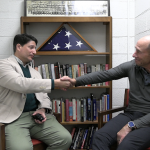American Revolutionary War Records
John Adair Jr. (Continental Army) Documents
John Adair Sr. was born in Ireland. In 1772 or 1773, he migrated to North Carolina with his family. He was appointed head of the North Carolina treasury. He aided the Revolutionary War by lending money to Colonels John Sevier and Isaac Shelby in 1780. His son, John Adair Jr. was born in 1754 in Ireland. He fought in the Revolutionary War. After the war, Adair was given 640 acres in the present north Knoxville/Fountain City area and became one of the first settlers there. In 1789, he opened a supply depot out of his home at the order of the Governor of North Carolina, which was named Fort Adair. He applied for a pension in 1832 at 78 years old. He is buried in Lynnhurst Cemetery. While exploring current-day north Knoxville, it is easy to notice many locations named after John Adair, such as Adair Drive and Adair Park.
William Blount (Continental Soldier/US Constitution Signee) Documents
William Blount was from Bertie County, North Carolina. He participated as a soldier with the Continental troops in the American Revolution and later served as a North Carolina representative and signer of the US Constitution during the Constitutional Convention. He became extremely wealthy through land speculation during the settlement of Tennessee at the end of the 1700s.
Joseph Hardin (Colonial Militia) Documents
Joseph Hardin, born in 1734 in Virginia, served as a colonel in the Revolutionary War. Before the American Revolution, Hardin joined the British Colonial Militia in the battles against Native Americans and held the rank of cavalry captain. In 1775, he was commissioned as a major in the North Carolina militia and later as a lieutenant colonel. He fought at the battle of Ramsour’s Mill in North Carolina and at the battle of King’s Mountain in South Carolina alongside John Sevier. After the war, he was given three thousand acres that would later become Hardin County, Tennessee. He was a prominent figure in the failed establishment of the State of Franklin and continued his military career in the wars with the Native Americans at the end of the 18th century. He died in Hardin Valley, Tennessee, named after him, on July 4, 1801.
David Henley (Continental Soldier) Documents
Colonel David Henley was originally from Virginia, where he served in the militia with George Washington. At the outbreak of the Revolutionary War, he joined Washington in New England and served as his intelligence officer, and also oversaw the imprisonment of British POWs. David Henley would be charged with criminal actions by British General Burgoyne in 1778. Henley was acquitted of all charges at his court-martial (the charges included murder and gross use of foul language) and was subsequently challenged to a duel by General Burgoyne. During the War, Henley went so far as to personally ensure many of the men of the Continental Army had clothing during the brutal winters of the Northern Theater. After the war, Henley acted as a federal agent for Washington’s War Department and traveled to modern-day Tennessee explicitly to oversee Indian Affairs, but also reported to Washington on the actions of William Blount. Henley was the “federalist spy” who uncovered Blount’s treason and is the reason he was brought to justice. Henley’s office on modern-day Gay Street was the reception area for the congress that drafted the first state constitution of Tennessee in 1796. In his later years, Henley worked as a clerk in the War Department in Washington, DC. He died in January of 1823 and was buried in the Georgetown Cemetery, but his grave location has been lost to time. His descendants later placed a cenotaph in the family cemetery in Monroe County, Tennessee, where it is still located today.



